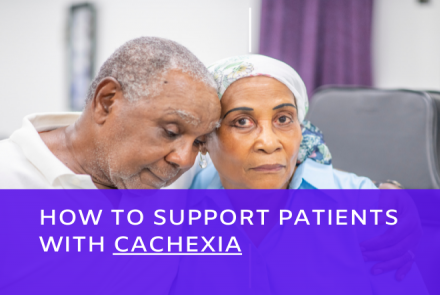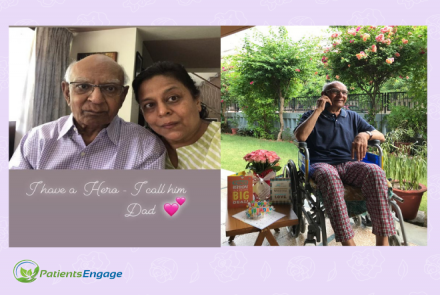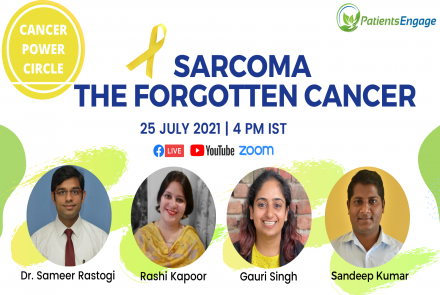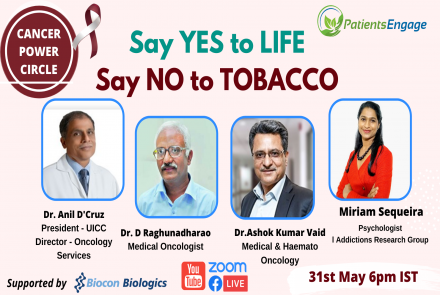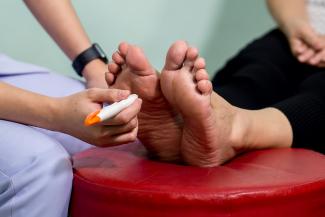
The prevalence of Chemotherapy Induced Peripheral Neuropathy (CIPN) is as high as 68% of all patients and 30% even six months after chemotherapy. It is important to understand the cause and find ways to deal with the pain. Caregivers should not dismiss the pain. Dr. Shital Raval explains CIPN, the symptoms and approaches for management of CIPN.
When the nerves outside of the brain and spinal cord are affected or damaged, it causes a condition called peripheral neuropathy. While there are numerous reasons for peripheral neuropathy, Chemotherapy-induced peripheral neuropathy (CIPN) is a condition that occurs specifically as a side effect of cancer treatment. It may be temporary for the length of the treatment or may turn into a progressive irreversible condition if ignored.
For cancer patients, possible causes are tumors compressing or affecting the peripheral nerves or side-effects of chemotherapy agents used in treatment. Elimination of the cause can greatly reduce the effects of neuropathy.
Chemotherapy drugs responsible for causing CIPN:
- Platinum drugs such as cisplatin, carboplatin, and oxaliplatin
- Taxanes including paclitaxel, docetaxel, and cabazitaxel
- Epothilones, such as ixabepilone
- Plant alkaloids, such as vinblastine, vincristine, vinorelbine, and etoposide
- Immunomodulating drugs such as thalidomide, lenalidomide, and pomalidomide
- Protease inhibitors like bortezomib and carfilzomib
- Eribulin
The incidence of peripheral neuropathy with these chemo agents is variable and can be anywhere from 4% to 74%. It is more prevalent in patients who have a past history of neuropathy or have risk factors such as diabetes, vitamin deficiencies or hypertension.
Symptoms of CIPN:
For most patients, the onset of symptoms starts in the later cycle of chemotherapy and gets worse as chemotherapy continues. Once chemotherapy has ended, symptoms improve on their own. Many patients may not experience any symptoms until after chemotherapy has ended. Symptoms start from the extremities and move upwards and inwards. Commonly experienced symmetrically in the extremities i.e. hands, fingers, feet, and toes. Some or all of these symptoms may occur.
- Tingling and Pins & needles
- Decreased or loss of sensation (pain, temperature and vibration)
- Burning sensation
- Weakness or decreased strength
- Decreased reflexes in knee and ankle
- Contact sensitivity (hyperesthesia)
- Difficulty in fine motor movements such as writing, buttoning up, picking up small objects etc.
What can you do about CIPN?
- Recognise symptoms early
- Inform your doctor
- Your doctor will investigate the exact cause of your peripheral neuropathy with thorough examination and testing. This will include a neurological and physical exam, blood test, electromyography, nerve conduction test and skin biopsy.
- Your doctor my decide whether to decrease, change or discontinue your current chemotherapy agent causing the neuropathy.
- You may be prescribed medication such as Duloxetine, steroids, numbing agents, opioids, and even anti-depressants to help manage the symptoms. Topical creams and gels (contain, diclofenac, amitriptyline, ketamine and /or menthol) are often prescribed for hands and feet.
- Try complimentary therapies such as acupuncture, electrical nerve stimulation, massages, auricular acupressure, physiotherapy, occupational therapy, relaxation techniques etc.
- Reach out to Palliative care health professionals for pain management and measures to improve quality of life. Most hospitals do have a palliative department, if not ask your Oncologist about Palliative centers.
- Adopt rehabilitative care methods such as:
- Preventing injuries to hands and feet (see the box on more tips on how to prevent injuries). Inspect feet and hands regularly and thoroughly for cuts, sores, scratches or areas of extreme dryness. In the event of any injuries, attend to it right away and bring it to your doctor’s attention in case you need antibiotics.
- Prevent falls: The risk of falls increases significantly with peripheral neuropathy. Falls can lead to health hazards (fractures, wounds etc) with hospitalization, and complications with your current cancer treatment plan. Prevention of falls can vastly avoid further deterioration of physical and mental health along with decreased mobility and independence.
- Exercise regularly as prescribed by your Physical and Occupational therapist.
- Incorporate yoga and meditation into your routine.
- Stop smoking and alcohol intake, which are known to cause nerve damage.
- Keep a check on your blood pressure. Watch out for symptoms like sweating and increased heart rate.
- Control your diabetes so that there in no additional complication of diabetic neuropathy.
- Prevent constipation and diarrhea because neuropathy can affect the functioning of the intestines causing bloating and bowel distress. Eat fiber rich foods, healthy balanced meals and lots of water.
How to prevent injuries and fallsWear therapeutic shoes and ensure they cover your entire foot. Use handrails or canes to help you move around with stability and better balance. Use a thermometer to check temperature of bath or sink water before using it. Avoid sharp objects or be mindful when using them. This may include knifes, scissors, needles etc. While cooking, be wary of the stove, oven, kettle and other hot objects. Use moisturisers daily to prevent cracking of skin during dry weather. During the winter months, wear warm socks and woollen gloves to keep warm. Wear protective gloves when doing any DIY repair or gardening work. Perform routine activities while sitting if you are unsteady on your feet. This may include brushing your teeth, showering, kitchen work etc. Keep a night light, access to light switches or a flashlight on your bedside table if you get up at night. Avoid driving and going out by yourself. Have someone accompany you whenever possible. Keep emergency numbers handy. Save them on your cell phone and post a printed list on your refrigerator/wall. |
References:
American Cancer Society. Peripheral Neuropathy Caused by Chemotherapy. Available from: http://www.cancer.org/acs/groups/cid/documents/webcontent/002908-pdf.pdf.
The Foundation for Peripheral Neuropathy. Chemo induced PN. Available at https://www.foundationforpn.org/what-is-peripheral-neuropathy/causes/chemo-induced-pn/.




